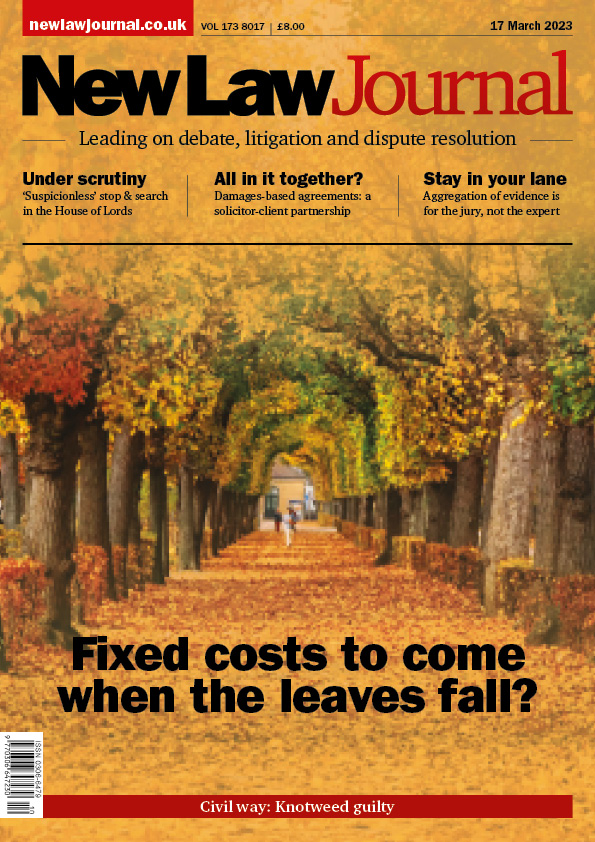THIS ISSUE

Damages-based agreements (DBAs) are the seldom-used option when it comes to ‘no win no fee’ cases, but is their lack of popularity justified? In this week’s NLJ, solicitor and DBA-proponent Richard Spector, partner at Spector Constant and Williams shares his personal experience of running DBA cases.
The extension of fixed recoverable costs is coming, despite some speculation that the project was being abandoned, Professor Dominic Regan of City Law School reveals in this week’s NLJ column, 'The Insider'.
Experts are advised not to amalgamate or exaggerate, when giving evidence, in an expert witness special in this week’s NLJ.
Nicholas Dobson dissects the nuisance case that hit the headlines and shocked art aficionados, Fearn v Tate Gallery Trustees, in this week’s NLJ.
‘Suspicionless’ stop and search is one of many controversial provisions in the Public Order Bill. Public and media attention has also focused on its restrictions on protest. Writing in this week’s NLJ, Neil Parpworth, of Leicester De Montfort Law School, looks in more detail at clauses 10 and 11, which sought to extend the powers of stop and search.
Fixed costs to come when the leaves fall? Dominic Regan tackles listing woes, distressed litigation funders & what’s spooking the banks
Vijay Ganapathy reflects on the pros and cons of QOCS reform, and highlights developments in the courts on whiplash claims and unsafe exposure
Neil Parpworth reports on the scrutiny of the Public Order Bill—and its proposed new powers for stop & search—in the House of Lords
Rooms with a view: Nicholas Dobson charts the long journey from the High Court to the Supreme Court and back again for Fearn v Tate Gallery Trustees
With the revocation of remaining EU legislation on the horizon, Fred Philpott highlights the challenges & opportunities for consumer credit law
MOVERS & SHAKERS

Keystone Law—Milena Szuniewicz-Wenzel & Ian Hopkinson
International arbitration team strengthened by double partner hire

Coodes Solicitors—Pam Johns, Rachel Pearce & Bradley Kaine
Firm celebrates trio holding senior regional law society and junior lawyers division roles

Michelman Robinson—Sukhi Kaler
Partner joins commercial and business litigation team in London
NEWS
The Legal Action Group (LAG)—the UK charity dedicated to advancing access to justice—has unveiled its calendar of training courses, seminars and conferences designed to support lawyers, advisers and other legal professionals in tackling key areas of public interest law
The Police and Criminal Evidence Act 1984 transformed criminal justice. Writing in NLJ this week, Ed Cape of UWE and Matthew Hardcastle and Sandra Paul of Kingsley Napley trace its ‘seismic impact’
Operational resilience is no longer optional. Writing in NLJ this week, Emma Radmore and Michael Lewis of Womble Bond Dickinson explain how UK regulators expect firms to identify ‘important business services’ that could cause ‘intolerable levels of harm’ if disrupted
As the drip-feed of Epstein disclosures fuels ‘collateral damage’, the rush to cry misconduct in public office may be premature. Writing in NLJ this week, David Locke of Hill Dickinson warns that the offence is no catch-all for political embarrassment. It demands a ‘grave departure’ from proper standards, an ‘abuse of the public’s trust’ and conduct ‘sufficiently serious to warrant criminal punishment’
Employment law is shifting at the margins. In his latest Employment Law Brief for NLJ this week, Ian Smith of Norwich Law School examines a Court of Appeal ruling confirming that volunteers are not a special legal species and may qualify as ‘workers’







